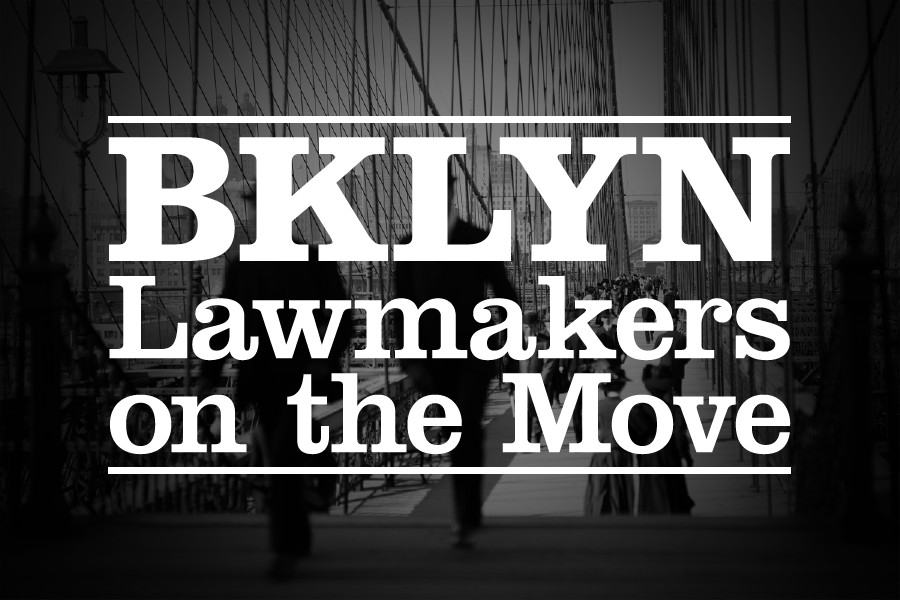Cuomo Calls For Budget Extender Until May 31

Governor Andrew Cuomo last night conceded that the State Assembly and Senate remain far apart of Raise the Age and affordable housing legislation, and couple with expected federal budget cuts, has called on the legislature to pass a budget extender until May 31.
The State FY 2018 budget deadline was Saturday April 1, and this will be the first late State budget in several years.
“The Legislature has not been able to reach total agreement on all issues necessary for a complete annual agenda. Raise the Age and affordable housing are especially controversial politically, but necessary governmentally. I will not accept ‘half a loaf’ on these issues,” said Cuomo.
“These are difficult and unusual times for our State and Country. An ultraconservative Congress poses an unsettling attack on individuals’ rights and American values. It is also clear that New York State is a target for hostile federal actions ranging from severe financial cutbacks to deprivation of legal and personal rights.
“The federal government is attacking our health care system, abandoning our urban areas, cutting necessary assistance to the poor and targeting our new immigrants.
“In this environment our state budget takes on much greater significance. Indeed, it is not merely a budget at all: It is a statement of values, a guarantee of personal protection and a safeguard of financial security.
“Now is the time to protect individual rights and ensure justice for all. Criminal justice reforms have long languished and must be enacted. New York is one of only two states in the nation to treat 16- and 17-year-olds as adults for purposes of criminal responsibility. Draconian punishments for youthful mistakes have ruined the lives of countless young New Yorkers. We must pass “Raise the Age” once and for all.
“Despite New York City’s record number of homeless, the federal government is proposing to cut back on their assistance. We must pass an effective affordable housing plan that both reforms and improves the old 421-a initiative and finally releases $2 billion to combat homelessness statewide. I signed the MOU releasing the $2 billion in homeless funds months ago and will not allow these funds to continue to be tied up in politics any longer.”
Adams, Golden, Williams Statements On Proposed Closure Of Rikers Island
Brooklyn Borough President Eric Adams, State Sen. Marty Golden (R-Bay Ridge, Dyker Heights, Gerretsen Beach, Marine Park) and City Council Member Jumaane Williams (D-Flatbush, East Flatbush, Midwood) all weighed in on Mayor Bill de Blasio’s announcement Friday of the City’s plans to close the Rikers Island jail in 10 years.
De Blasio on Friday, along with a blue-ribbon panel headed by former state Chief Judge Jonathan Lippman recommended closing the crime plagued facility and open up at least one jail in each borough as a replacement. Rikers Island currently houses about 10,000 inmates and both de Blasio and the commission said that number would have to drop to about 5,000 before Rikers is shuttered.

“Closing Rikers Island is a laudable and valuable mission. I am supportive of this goal, with the full understanding that there must be a comprehensive criminal justice plan in place that ensures public safety remains our paramount priority. Until that plan is in place, we must and will press ahead with important reforms such as alternative sentencing, mental health support, speedier trials, and warrant clearance. Any conversation of new correctional facilities must be led with agreement on the supportive infrastructure and services that communities will need; this cannot be an afterthought,” said Adams.
But Golden, a former New York City Police Officer, it is startling to see a conceptual agreement on such a
major issue, without an actual plan to maintain public safety in the City.

“The many unknown details of this plan are rather alarming to many New Yorkers including myself. Where is the Mayor going to put the 12,000 inmates currently housed at Rikers Island? Will the final plan be one
similar to the decentralized plan developed to address the homeless crisis our City is facing? Which communities throughout the five boroughs will now be forced to house a City jail?” asked Golden.
“There needs to be a long-term plan that focuses on the safety of New Yorkers and at the same time sees justice served. As the Mayor and the City Council advance the closure of Rikers Island, the reality is that crime will continue to take place on the streets of New York City. And when crimes happen and arrests are made, people will need to be put behind bars.”
Williams said the number one question asked since the campaign to end Rikers began is, ‘would you take a jail in your neighborhood?’ That question helps highlight some of the major issues with the criminal justice system.

“First, it assumes that jail and prison is the only answer we have, even for the approximately 80% of people in Rikers who have not been convicted, and are too poor to post even nominal bail. Second, it puts everyone on the defensive, making harder critical thinking by immediately thinking we don’t want ‘them.’
“No one with a conscience, can see what’s happening on Rikers Island and think the facility should remain open. Part of the problem is its distance from the rest of the City. The isolation assists in keeping any problem out of sight, and aids in dehumanizing ‘them.’ This is a problem certainly, and in fairness for the officers put in a system designed for the results we’ve seen.
“Now that there’s been a commitment to close the detention center, we must think of a responsible way to shut down Rikers Island. While it could mean new facilities, it doesn’t necessitate it. A combination of pre-trial tools and policies and existing penitentiaries could suffice. Not to mention the ongoing positive shift to investing in a preventative paradigm.
“People like to say the criminal justice system is broken, however, in actuality the system is working how it was designed to work. It’s a part of the foundation of this country. A simple reminder made today by reporter Mara Gay who reminded us that ‘Rikers Island bears the name of Richard Riker, the city recorder who sent blacks back to slavery in the south without fair trial.’ Fortunately, there’s always been people pushing back on the immoral construct from the beginning.”
Gillibrand, Nadler Call To Reject Cuts all National Arts & Humanities Programs


U. S. Senator Kirsten Gillibrand and Congressman Jerry Nadler (D-Western Brooklyn, Manhattan) yesterday called on Congress to reject President Trump’s budget proposal to eliminate all federal funding for the National Endowment for the Arts (NEA) and National Endowment for the Humanities (NEH), as well as the Corporation for Public Broadcasting (CPB) and the Institute of Museum and Library Services (IMLS).
The NEA and NEH current annual budgets are $148 million each. Organizations in the city received approximately $15 million from NEA, $11 million from NEH and $4 million from IMLS for FY 2016. Organizations in the city received approximately $15 million from NEA, $11 million from NEH, and $4 million from IMLS for FY 2016, with CPB supporting public media stations serving the city with more than $20 million in funds.
Also, according to a recent report by the Comptroller’s office, the city received $233.2 million in NEA funding from 2000 to 2016 and 419 cultural nonprofit organizations received funding in 2016.
A recent analysis by Americans for the Arts found that New York state is home to over 50,000 arts-related businesses that employ approximately 314,000 people accounting for over 5 percent of the total businesses in New York and 3.5 percent of the people they employ.
“The lives of New York’s children are richer because of critical educational programs funded by these important institutions,” said Gillibrand. “Not only do these programs inspire our children to learn, they also help drive New York’s economy and help create jobs. These programs provide resources to help teach our students. They fund educational programming on PBS beloved by children and their families, and they give veterans a new lens to understand their experiences and reintegrate into their communities. We should never allow these programs to be eliminated, and I will continue to do everything I can to fight these proposed cuts and restore funding.”
Nadler said the NEA, NEH, CPB and IMLS are each integral parts of the country’s cultural infrastructure, and Trump’s proposal to severely cut if not totally eliminate to these institutions demonstrate nothing less than a desire to undermine the foundations of American culture and society.
“Not only do these institutions support traditional educational services—such as Sesame Street and PBS—but also many other important programs that enrich the lives of millions, including art therapy for our veterans, community orchestra performances, and Braille classes at local libraries. To claim that eliminating these agencies will save taxpayers money is absolutely ludicrous – another falsehood perpetrated by conservatives advocating draconian cuts. For all his talk of “make America great again,” President Trump is overseeing a complete bankruptcy in our country’s cultural heritage with these proposals,” said Nadler.
Squadron & Dilan On ‘Raise the Age’ and other Justice Reform Bills


As lawmakers in Albany continues the negotiate the now late FY 2018 state budget with several legislative policies tied into it, State Senators Dan Squdron (D-Northern Brooklyn, Lower Manhattan) and Martin Malavé Dilan (D-Bushwick, Willaimsburg) weighed in on ‘Raising the Age of Criminal Responsibility’ to be tried and held as an adult from 16 to 18 and on speedy trial justice reform.
Legislation dealing with both issues are currently being tied into budget negotiations.
“I understand the gamesmanship in mixing policy in the budget. It can force an issue into a larger public debate and use funds to drive a compromise. However, not all policy is subject to concessions. There is nothing to concede when we are talking about incarcerating children. Raising the age of criminal responsibility is a campaign based solely on science and tragedy,” said Dilan. “There is no amount of horse trading, watering-down, delayed or regional implementation, or sunsets that mark the successful passage of sound policy. It stands on its merits. Either we raise the age, or we don’t; we continue to fast-track children into our penitentiaries, or we don’t.”
Squadron, who co-sponsored the ‘Raise the Age’ bill (S.4157) with State Sen. Velmanette Montgomery (D-Bedford-Stuyvesant, Fort Greene, Clinton Hill, Boerum Hill, Red Hook) Montgomery) and was the lead sponsor of ‘Kalief’s Law’ (S.1998A-Squadron/Aubry) to fix New York’s broken speedy trial law released the following statement in response to reports that the Senate Majority may force ‘Raise the Age’ out of budget negotiations, after rejecting speedy trial reform in the budget:
“The momentum for criminal justice reform comes from the basic understanding that too often, our criminal justice laws breed injustice,” said Squadron. “The Senate Majority has already rejected speedy trial reform — Kalief’s Law — in the budget. To also eliminate ‘Raise the Age,’ despite the groundswell of public support for reform, would be an affront to all those who the system treats unfairly, and the many young people who face less appropriate justice in New York than they would in 48 other states.”
Schumer Ramps Up Effort To Protect Privacy From Internet Services

U.S. Senator Charles E. Schumer yesterday ramped up his call for President Trump to veto a resolution that rolls back critical broadband privacy regulations that were put in place by the Federal Communication Commission (FCC) to prevent internet service providers (ISPs) from collecting and selling personal sensitive information, like your health info, finances, social security number and more.
“If President Trump clicks his pen and signs this resolution, consumers will be stripped of critical privacy protections in a New York Minute,” said Schumer. “Signing this rollback into law would mean private data from our laptops, iPads, and even our cellphones would be fair game for internet companies to sell and make a fast buck. An overwhelming majority of Americans believe that their private information should be just that—private—and not for sale without their knowledge.”
Schumer said that, if signed by the President, the contents of an individual’s emails or web browsing history—which could include anything from health to finances to SSN and more– could be sold to third parties without the individual’s explicit consent. Schumer explained that because the bill was sent to Trump on Friday, according to rules, he now has just nine days make a decision and tell us whose side he’s really on.
Under current rules, information such as one’s SSN, email contents, browsing history, precise geo-location, app usage, and health and financial information were defined as sensitive personal data. As a result, ISPs would be barred from using this data, unless the consumer consented. If signed by President Trump, this bill would allow broadband providers like Comcast, Verizon, AT&T and others free rein to share this sensitive information with data farms and advertisers without affirmative consent. Furthermore, the legislation would prevent the FCC from reinstating similar privacy protections in the future.
Persaud Constituent Services Helps Disabled Vet

State Sen. Roxanne Persaud (D-Canarsie, Mill Basin, Bergen Beach, East New York, Brownsville, Sheepshead Bay) recently helped a U.S. veteran constituent that contacted her office for assistance regarding unpaid compensation for disability.
This constituent had served our country during the 1980’s. She developed health issues, she believed were a direct result of her tour of duty. She filed for disability but this was denied. She then filed an appeal. Upon doing so, the judge ruled that her case should be re-examined. Based on the medical findings she was deemed eligible for disability compensation, Persaud said in her weekly e-newsletter.
“The judge ruled in favor of her expeditiously receiving disability compensation. This occurred in 2006, however, 10 years later, the constituent still had not received her disability payments. When the constituent contacted our office we immediately reached out to the US Department of Veteran’s Affairs Regional Office in NY. They investigated her situation and she began receiving her disability payment one month later,” said Persaud in the newsletter.
Persaud said if there are any constituents facing a challenging situation, they do not have to battle it alone. “My staff is always willing and available to assist you in arriving at a favorable resolution to your situation,” she said.
Persaud’s district office is at 1222 East 96th Street in Canarsie. The Phone number is 718-649-7653. Persaud’s email is persaud@nysenate.gov.
Donovan Introduces Bill To Curb Nationwide Opioid Epidemic

Congressman Dan Donovan (R-South Brooklyn, Staten Island) and Congressman Tom Rooney (R-FL) Friday reintroduced the Comprehensive Fentanyl Control Act.
The legislation focuses on saving lives by updating federal criminal law to reflect the potency of synthetic opioids like fentanyl and to stop the sale of pill presses purchased online by criminals who use them to mass produce counterfeit painkillers.
Illicit fentanyl can be deadly in doses as small as two milligrams, and according to the Drug Enforcement Administration (DEA), traffickers are lacing heroin and other substances with small traces of illicit fentanyl to boost the drugs’ potency and their own profits, and to deadly effect.
According to the Centers for Disease Control and Prevention (CDC), the increase in opioid overdose deaths across the country is directly attributable to the rise in the manufacturing and distribution of illicit fentanyl coming from China, which is shipped to Mexico and trafficked across the U.S. border.
The overwhelming amount of overdoses can also be blamed on the availability of pill presses, which can be purchased online and are now being used by criminals inside the U.S. to create counterfeit painkillers that contain lethal doses of fentanyl.
“As a former prosecutor, I have seen firsthand the devastation caused by drug addiction. While our nation works to address the opioid abuse epidemic, it’s critical that we distinguish between those struggling with addiction and the traffickers who enable them,” said Donovan.
“Drug traffickers are intentionally lacing their products with synthetic opioids like fentanyl — knowing that their actions lead to overdoses and death. Society can’t cure this dark branch of the drug problem with medically-assisted treatment and therapy; only law enforcement agents and judges can meet the threat.”










